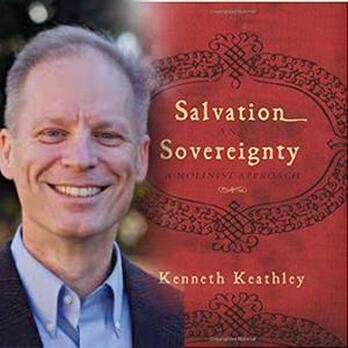 Molinism is a theology developed by 15th century Jesuit priest Luis de Molina as a half-way thing “between Calvinism and Arminianism.” It is defined as follows by Jake Rainwater: “Molinism is an attempt to reconcile God’s sovereignty and man’s responsibility through the use of ‘middle knowledge.’ Between God’s ‘natural knowledge’ of everything that could be and God’s free knowledge of everything that is, there is God’s middle knowledge of everything that would be” (“Salvation and Sovereignty: A Molinist Approach,” Oct. 3, 2017). If you don’t understand that, you are not alone! Molina himself didn’t understand it. “Middle knowledge” is a worthy addition to the many other inscrutable Calvinist terms, such as supralapsarianism, sublapsarianism, infralapsarianism, compatibalism, monergism, synergism, hypothetical atonement, libertarian free will, subjective grace, immediate imputation, desiderative will, and antecedent hypothetical will. A major proponent of Molinism today is Southern Baptist Kenneth Keathley, professor of theology at Southeastern Baptist Seminary in Wake Forest, North Carolina. Keathley’s book Salvation and Sovereignty: A Molinist Approach is listed on the “Reading for Leading” list of Paul Chappell, pastor of Lancaster Baptist Church of Lancaster, California. Keathley’s approach is described as follows: “Molina’s middle knowledge is key for Keathley’s soteriology. After introducing and laying the framework in the first two chapters, Keathley borrows Timothy George's ROSES framework (an alternate to TULIP - Radical depravity, Overcoming grace, Sovereign election, Eternal life, Singular redemption) to unpack his Molinist soteriology. Keathley is a clear writer, and has the ability to bring lofty concepts such as the workings of the Molinism and soteriology down to an accessible level.” Reformed Theology has spread widely throughout the Southern Baptist Convention in recent decades, having first captured its seminaries, and it is spreading rapidly among the more intellectual Independent Baptists, with Bob Jones University graduates at the forefront. In truth, Molinism is Jesuitical philosophical junk. Some men can’t simply and humbly accept what the Bible says; they must try to bind Bible teaching into a philosophical package (which they call systematic theology). And Molinism holds to the fundamental error of John Calvin and his mentor Augustine, which is “sovereign election” (or “unconditional election”). The Bible’s approach is foreknowledge election, not “sovereign election.” That’s what we see in two major passages on election, Romans 8:29-30 and 1 Peter 1:2. The Bible begins with God’s foreknowledge. And fore-knowledge is not fore-will; the Greek proginosko (verb) and prognosis (noun) in Ro. 8:29 and 1 Pe. 1:2 mean “to know beforehand, to foresee, forethought.” Foreknowledge election, which is the plain teaching of Scripture, allows for and encompasses all that the Bible says about human free will and choice and the fact that the gospel is for whosoever will. Election is as complicated as God Himself, but it is simple enough at a basic level as revealed in Scripture. The doctrine of the Trinity, too, has a basic simplicity that a child can understand, if we let the Bible speak for itself in its own words and don’t try to go beyond Scripture. “The Father sent the Son to be the Saviour of the world”! Foreknowledge election is something I can teach to highly literate and illiterate, which I do in our missionary work. I don’t have to try to explain dense, manmade terms. If you try to philosophize and enter into the mysteries of God’s eternal counsels beyond the Bible’s actual teaching in the Bible’s own precise words, you waste a lot of time and enter dangerous spiritual territory. (Friday Church News Notes, February 8, 2019, www.wayoflife.org, [email protected], 866-295-4143) Comments are closed.
|
Archives
February 2020
|
Ads do not imply endorsement | Policy/Terms of Service | About Us | Contact Us | © Life Work Academy, Inc.
 RSS Feed
RSS Feed

